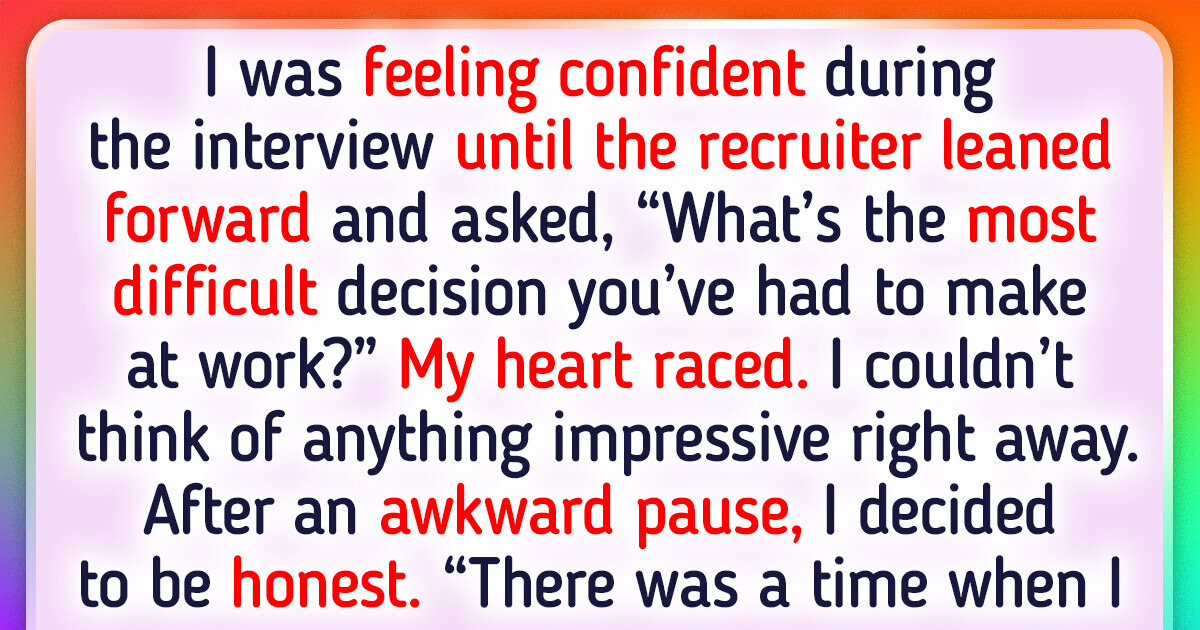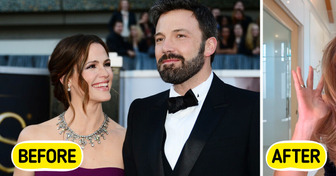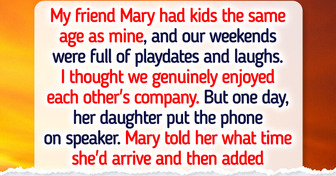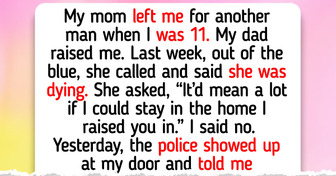12 People Shared Creepy Stories About the Most Horrific Deeds of Their Ex


Job interviews can be nerve-wracking, filled with unexpected questions and high-pressure moments. But with the right preparation and real-life wisdom, you can turn these challenges into opportunities to shine. Here are proven, relatable tips straight from personal experiences that will help you ace your next interview and land that dream job.
I once walked into an interview feeling confident about my resume. The recruiter scanned it and asked, “Tell me something that’s not on here.”
I froze. My brain went blank. Later, I realized I should’ve had a story ready that highlighted a personal strength or a unique experience.
The next time someone asked that, I shared how volunteering at a local shelter taught me teamwork and problem-solving skills that translated into my professional life. That answer got me the job.
My husband was quizzing me as I prepared for my big interview. “What will you say if they ask when you can start working?” he asked. I quickly replied, “I’ll tell them, I can start as soon as possible!”
He frowned and shook his head, “Bad idea. You should say two weeks. It shows that you’re loyal to your current team and not someone who just leaves them hanging.”
My friend Sarah was preparing for her interview when she said, “I’ll tell them I expect $60,000.”
I told her, “Don’t give a number right away! Let them throw a figure first. It gives you more room to negotiate.”
One interview ended with, “Do you have any questions for us?” I said, “No, I think I’m good.”
Rookie mistake. My friend told me, “Always prepare thoughtful questions. It shows interest and enthusiasm.”
One time, they asked me what my greatest professional achievement was. I started talking about a big project I led, but then I realized I hadn’t connected it back to the job I was applying for.
My friend later told me, “Make sure your achievements align with the company’s needs. Show them how what you’ve done will benefit them.” So, the next time I got that question, I connected my success story to the company’s goals, which really helped me stand out.
I was feeling confident during the interview until the recruiter leaned forward and asked, “What’s the most difficult decision you’ve had to make at work?”
My heart raced. I couldn’t think of anything impressive right away. After an awkward pause, I decided to be honest. “There was a time when I had to choose between delivering a project on time or asking for an extension to maintain quality. I chose to ask for more time, and it ended up being the right call. The client was thrilled with the results.”
The recruiter smiled. “Good answer. We value people who prioritize quality.”
I once had an interview where they asked about my salary expectations, and in a panic, I blurted out, “I’ll take whatever you offer!” The recruiter stared at me like I just suggested we work for free.
I quickly added, “Uhm, just kidding... let’s talk numbers.” Afterward, my friend said, “Next time, don’t sound like you’re desperate for free pizza.”
During the interview, the hiring manager suddenly asked, “If you could change one thing about your last job, what would it be?”
I hesitated. I didn’t want to badmouth my previous employer. I finally said, “I would’ve loved more opportunities to collaborate across departments. I thrive when I can learn from different perspectives.”
He smiled. “We encourage cross-department projects here. I think you’d fit right in.”
When they asked why I left my last job, I said, “Because my boss was a... uh, let’s say, ‘challenging’ character.” The recruiter blinked and then said, “Interesting... What do you mean by ‘challenging’?”
I quickly said, “I was looking for a better fit, where I could grow more.” My friend later said, “Keep it professional. No one wants to hear about your ’challenging’ boss.”
Interviewers love to know how you prioritize tasks. Instead of just saying, “I make a to-do list,” explain the process you follow.
You might say, “I start by identifying urgent tasks and breaking larger projects into smaller, more manageable steps. This way, I can stay focused and meet deadlines.” They’ll appreciate hearing a clear, practical approach.
Be careful not to sound too specific. For example, don’t say, “I need a quiet office with no distractions.” Instead, try something like, “I work best in an environment where collaboration and open communication are encouraged, but I also enjoy having space to focus when necessary.”
This shows you’re flexible but also know how you work best.
If they ask how you handle conflict, they want to know if you can stay calm and professional in tense situations.
A good answer might be, “When conflicts arise, I stay calm, listen to all sides of the situation, and try to find a solution that works for everyone. I think open communication is key to resolving issues effectively.”
Before any interview, do some research on the company. You don’t need to know everything, but being able to mention recent projects, their mission, or their company culture shows you’ve done your homework.
For example, “I’ve read about your recent initiative to expand into new markets, and I’m really excited about how my skills could contribute to that growth.”
The interview was going smoothly until the manager asked, “What makes you unique?”
I almost defaulted to a cliché answer but instead said, “I have a knack for simplifying complex problems. Once, my team was stuck on a technical issue for days. I broke it down into smaller parts, and we solved it within hours.”
She leaned forward. “We need more people like that here.”
Every interview is a chance to showcase your skills, personality, and problem-solving abilities. By learning from real-life situations and preparing thoughtful responses, you’ll not only impress recruiters but also boost your confidence. Remember, preparation and authenticity are your greatest allies in getting the job of your dream.











